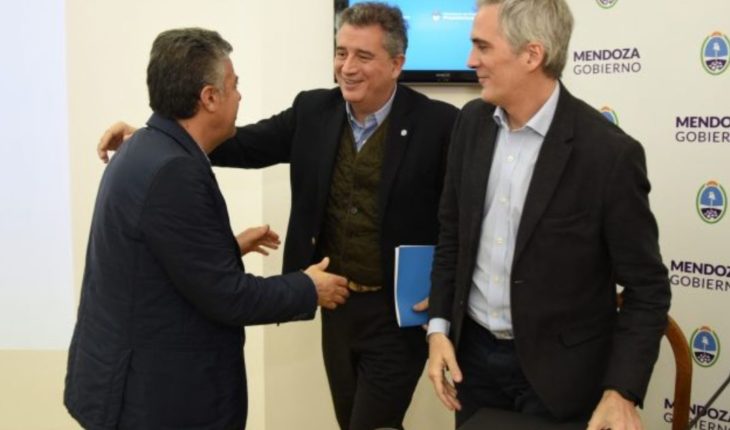Governor Alfredo Cornejo; the Secretary of Government of Agroindustria de la Nación, Luis Etchevehere; Finance and Finance Minister Paula Allasino; met with chambers and agricultural entities to discuss the impact of the decline in withholdings and the Mercosur-European Union agreement.At the meeting held in the Patricias Mendocinas Hall on the fourth floor of the Government House, the the scope of the Free Trade Agreement and the possible impact on the competitiveness of Mendoza’s major exporting sectors.” We are very happy with this agreement. We have worked with the national government on these issues, we believe it is of great benefit to Mendoza products. It is positive to work it with a long time, so that our local competitors can agree and that we are all competitive. We have had a meeting with a large part of the chambers and companies involved and they have been satisfied with the agreement reached,” said Cornejo.In his turn, national secretary Etchevehere commented: “Of 207 products from regional economies there will be casualties 4 to 3 pesos for each and this will have a high impact across the region. Argentina had only trade agreements with 10% of global GDP and the European Union means 20% of global GDP, so we are going to move on to having trade relations with 30% of GDP and this is very important.” Of the 10 thousand tariff positions negotiated in this agreement, 1,800 are for agribusiness and 84% of these tariff positions will have zero tariff and 70% will enter with zero tariff on the first day the agreement is launched in the next time . To make this agreement, which took 20 years, much work had to be done and the President did, built trust and consensus with leaders from countries around the world. We were able to show that we are prepared to take on this important responsibility,” he added. On the benefits for the country, the Minister of Agroindustry remarked: “An agreement like this strengthens political, cultural and economic ties, creates a modern economic environment, increases investment opportunities and regional exports, is gradually, allowing for adapting. The intention to sign this agreement was to generate employment in the two blocs, so all sensitivities in all regions were taken into account, so as not to cause harm.” Finally, Etchevehere emphasized: “We don’t like withholdings, we don’t see it as a tool of economic policy, so every time we can reduce them we do. In this case there is a reduction to 207 products from Argentina from different regions of the country, and it means a fiscal cost of 2.2 billion pesos, which is a relief. The due date for these withholdings is arranged for December next year and will run for three years.” Minister Paula Allasino said: “The country and the province needed such an agreement. We had to start having serious state policies for years to come. And this is a fundamental step. As the Governor just pointed out, we must look after the general interest and not the particular interest.” Then the local producers took the floor. Fernando Morales of the Chamber of Mosto stated that the agreement “generates satisfaction, we are satisfied that they have been incorporated. Our main wort competitors are outside the country, such as Chile and Spain. Today the must captures 30% of the grape harvest and this new market opportunity that opens up within 10 years will help us to continue adding value to our products.” Carlos Ponce of the Plum Export Chamber commented: “We have been summoned by the Government and we are pleased with the future projection. Working with the European Union will be really good. In terms of volume, this is a very big opportunity for the Mendoza South and hopefully it can be replicated in other markets to gain competitiveness.”
translated from Spanish: Cornejo and Etchevehere presented the Mercosur-European Union agreement
July 13, 2019 |





